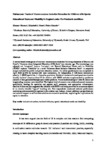Mainstream Teachers’ Concerns about Inclusive Education for Children with Special Educational Needs and Disability in England under Pre-Pandemic conditions
| dc.contributor.author | Warnes, E | |
| dc.contributor.author | Done, Elizabeth | |
| dc.contributor.author | Knowler, H | |
| dc.date.accessioned | 2021-05-19T07:00:03Z | |
| dc.date.issued | 2021-06-02 | |
| dc.identifier.issn | 1471-3802 | |
| dc.identifier.issn | 1471-3802 | |
| dc.identifier.uri | http://hdl.handle.net/10026.1/17156 | |
| dc.description.abstract |
<jats:p>A survey‐based investigation of teachers’ concerns was conducted the following adaptation of Sharma and Desai’s ‘Concerns about Integrated Education (CIE) Scale’ two decades ago. The terminology was adjusted and ‘integrated’ became ‘inclusive’, and ‘Special Educational Needs and / or Disability (SEND)’ replaced ‘disability’ in a novel ‘Concerns about Inclusive Education Scale’. A purposive sample included the public and private education sectors. An online questionnaire was completed in April 2020 (<jats:italic>n</jats:italic> = 93) by teachers (66: state mainstream, 18: independent, 5: UK‐based international schools, 3: SEND specialists, 1: alternative provision). Statistical analysis of closed questions aimed to identify teachers’ concerns about IE for children with SEND and was complemented by qualitative analysis of data generated through open‐ended questions. Varied understandings of what IE means and longstanding concerns were identified. The highest level of concern was evidenced around resources, specifically, funding for specialist and support staff, resources, and appropriate infrastructure. Qualitative data analysis suggested that children with SEND risk being perceived as an onerous adjunct to an already stressful ‘regular’ teaching role. Few respondents mentioned national performance monitoring and accountability regimes in this context and, instead, viewed additional paraprofessional and external support as self‐evident solutions to excessive workloads, neglecting the implications for equity in education.</jats:p> | |
| dc.format.extent | 31-43 | |
| dc.language | en | |
| dc.language.iso | en | |
| dc.publisher | Wiley | |
| dc.subject | 4 Quality Education | |
| dc.title | Mainstream Teachers’ Concerns about Inclusive Education for Children with Special Educational Needs and Disability in England under Pre-Pandemic conditions | |
| dc.type | journal-article | |
| dc.type | Journal Article | |
| plymouth.issue | 1 | |
| plymouth.volume | 22 | |
| plymouth.publication-status | Published | |
| plymouth.journal | The Journal of Research in Special Educational Needs | |
| dc.identifier.doi | 10.1111/1471-3802.12525 | |
| plymouth.organisational-group | /Plymouth | |
| plymouth.organisational-group | /Plymouth/Faculty of Arts, Humanities and Business | |
| plymouth.organisational-group | /Plymouth/Faculty of Arts, Humanities and Business/Plymouth Institute of Education | |
| plymouth.organisational-group | /Plymouth/REF 2021 Researchers by UoA | |
| plymouth.organisational-group | /Plymouth/REF 2021 Researchers by UoA/UoA23 Education | |
| plymouth.organisational-group | /Plymouth/Users by role | |
| plymouth.organisational-group | /Plymouth/Users by role/Academics | |
| dcterms.dateAccepted | 2021-05-11 | |
| dc.rights.embargodate | 2021-6-5 | |
| dc.identifier.eissn | 1471-3802 | |
| dc.rights.embargoperiod | Not known | |
| rioxxterms.versionofrecord | 10.1111/1471-3802.12525 | |
| rioxxterms.licenseref.uri | http://www.rioxx.net/licenses/all-rights-reserved | |
| rioxxterms.licenseref.startdate | 2021-06-02 | |
| rioxxterms.type | Journal Article/Review |


